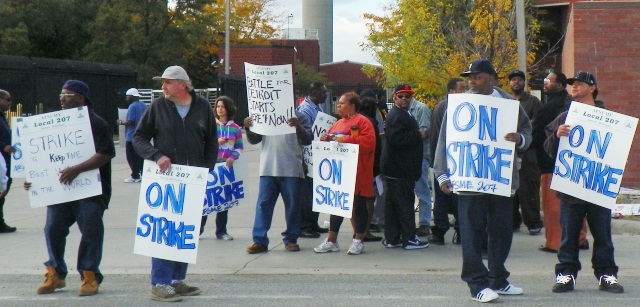
Unison general secretary Dave Prentis was at St Thomas' Hospital at 6.45am on Wednesday to meet staff. The Government is not solving a crisis but creating one." "The biggest threat to the long-term well-being of the pension scheme comes from these proposed changes, which will reduce the number of people joining due to such prohibitive costs and force existing members to leave. The Local Government Pension Scheme, which many of our members pay into, is cash rich, taking more in contributions than it pays out in pensions each year. "Not only are these changes unfair, but they are unnecessary. "At a time of year on year real term pay cuts, sky-rocketing energy prices and spiralling transport costs, the Government is telling public sector workers that they have to pay an average of 50 per cent more in pension contributions," explains Bronwyn Murphy, Unison branch secretary at London South Bank University.

Inflation in the UK surged in May to its highest annual rate in 40 years, official data showed, piling pressure on the government to step up assistance for households facing a worsening cost-of-living crisis.
#30 STRIKES DRIVERS#
“Some people do have sympathy with the striking workers, it’s not just train drivers and guards, these are railway staff across a lot of professions”, Brennan said, adding: “People say look the cost of living is such as going up at such a rate that people are entitled to a pay rise”.īut other commuters are frustrated with the disruptions. UK public is divided on their support for strikes. Only 45 percent of the whole network will be operating, and with that number of services cut to one fifth compared with a regular day. Pamphlets and newspapers are distributed at a picket line outside Waterloo Station in London Īl Jazeera’s Paul Brennan reported from the UK’s biggest and busiest station Waterloo, saying “extraordinary sight compared to normal” day. The strikes are the biggest dispute on the UK’s railway network since 1989, according to the RMT. Schools are warning that thousands of teenagers taking national exams will also be affected. The walkouts – also on Thursday and Saturday – risk causing significant disruption to major events including the Glastonbury music festival. “I absolutely deplore what they’re doing today and there is no excuse for taking people out on strike.”īut Mick Lynch, RMT’s general-secretary, described as “unacceptable” offers of below-inflation pay rises by both overground train operators and London Underground that runs the Tube in the capital. “The people that are hurting are people who physically need to turn up for work, maybe on lower pay, perhaps the cleaners in hospitals,” he told Sky News broadcaster. Transport Secretary Grant Shapps said he “deplored” the strikes, which he said evoked the “bad old days of the 1970s”. Major stations were largely deserted on Tuesday morning, with only about 20 percent of passenger trains scheduled to run, forcing people to either work from home or find alternative routes into the office. Passengers queue for a bus outside Waterloo Station on the first day of the rail strike in London

The government says it is not involved in the talks, but has warned that big raises will spark a wage-price spiral driving inflation even higher. The union accuses the Conservative government of refusing to give rail firms enough flexibility to offer a substantial pay increase. The Rail, Maritime and Transport Union (RMT) says it will not accept rail firms’ offer of a 3 percent raise, which is far below the rate of inflation, currently running at 9 percent. Last-minute talks on Monday failed to make a breakthrough.

But that is well below pre-COVID-19 levels, and train companies, which were kept afloat with government support during the past two years, are seeking to cut costs and staffing. There were almost 1 billion train journeys in the UK in the year to March. The dispute centres on pay, working conditions and job security as the UK’s railways struggle to recover from the coronavirus pandemic. Tens of thousands of the UK’s railway workers began the network’s biggest strike action in more than 30 years, leaving commuters facing chaos.Ībout 40,000 cleaners, signalers, maintenance workers and station staff were holding a 24-hour strike on Tuesday, with two more planned for Thursday and Saturday.


 0 kommentar(er)
0 kommentar(er)
